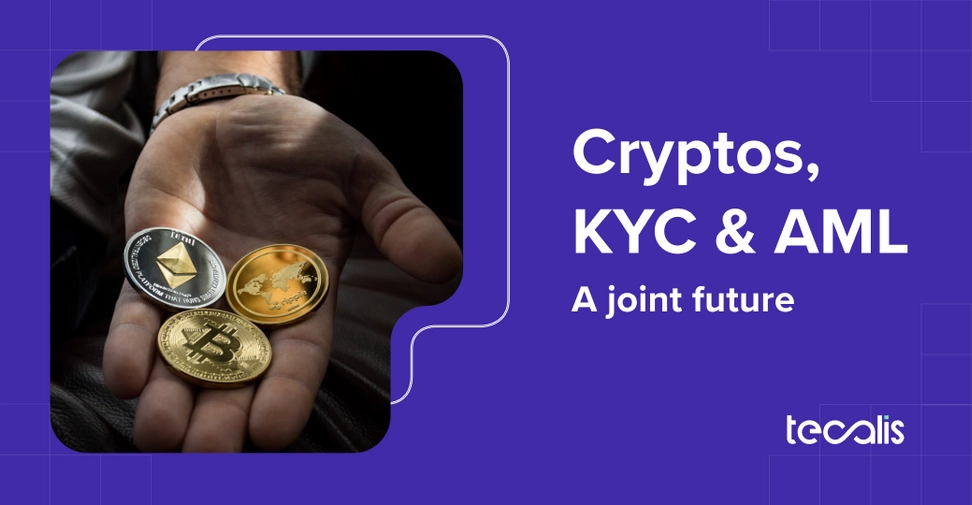Index
Get the latest news right in your inbox
Cryptocurrencies are a reality that we cannot ignore, as well as the KYC processes integrated with many of the platforms where we can operate with them. Before delving into the relationship between KYC and cryptocurrencies, we must have a good understanding of the current state of these digital assets and how they are already being addressed.
Not all cryptocurrency exchanges offer the same guarantees and support their users in the same way. The advantages and disadvantages of each are aspects to be assessed when deciding on which platform to buy and sell crypto assets.
However, it has been found that the leading cryptocurrency trading platforms and exchanges with the most users are those that are integrating customer onboarding processes based on KYC and AML standards.
What are cryptocurrencies
Cryptocurrencies are not particularly different from the "official" money issued by states and central banks. They are still an exchange asset, the main difference being that they are not physical, but digital. Even so, the information that makes them exist can be stored in a physical device, which, in a way, brings them even closer to the concept of currency.
They can be transferred without intermediaries and are decentralized. Thus, we define cryptocurrencies as a medium of exchange that uses cryptography (data encryption and encoding techniques to alter information so that it can only be read by certain recipients) for its transactions. Crypto transfers are public to secure their system with a "white book" that can be consulted by anyone and that records all transactions.
Different types of crypto
When we talk about types we can refer especially to digital purses or wallets. Here you can store, send and receive cryptocurrencies thanks to the keys that give their ownership to operate with them. These keys allow us to pay with them or transfer them. There are hot and cold wallets, the former being fully online and the latter stored in a hardware device.
As for the number of cryptocurrencies that exist, they already number in the thousands. In order to create one, you must have advanced knowledge in cryptography and know how to program to clone the code of another existing one.
The most popular cryptos
Bitcoin was born in 2009 with the objective of being a means of payment not supervised by any government. It was the first and remains one of the most important. As it is intended to be an alternative to the traditional system, it is known as "flat currency".
Its companion in terms of the high listing is Eher, which also gives its name to its own platform for making smart contracts (Ethereum). Its main purpose is to be a payment method for using this same platform (with uses such as app creation, decentralized finance, NFTs or Decentralized Autonomous Organizations), and not so much an investment method.
Binance, Stellar XML, Dodge Coin, Litecoin and Cardano ADA are very relevant cryptocurrencies today and both share their goal and philosophy with Bitcoin despite minor differences.
Where to buy and store cryptocurrencies
Cryptocurrencies can generally be purchased through exchanges, which are financial brokers, or intermediaries, that connect with your trusted bank to carry out the exchange.
As detailed above, many cryptocurrency exchanges and trading platforms (companies that offer services for buying and selling financial assets digitally) offer the possibility of storing them.
Crypto exchanges or cryptocurrency exchanges function as virtual tools and spaces for this purpose. The operations of buying and selling different cryptocurrencies are carried out thanks to other crucial operations that surround this process: the onboarding of the user, the deposit, the withdrawal or the purchase of cryptos with origin in FIAT (fiat) currencies. Keeping in mind how these process works is crucial to see how these platforms can grow and be secure.
Crypto exchanges and trading platforms: different ways of being
Not all platforms for buying, selling and storing crypto assets are the same. Broadly speaking, their differences lie, after all, in the concept of user verification:
- Exchanges and generalist trading platforms: In them, the value of crypto and its operation works according to the price and value in the market. They are generally regulated and must have identity verification processes, anti-fraud and AML controls, as well as electronic signatures for certain matters.
- Brokers: Focused on trading at market prices, they identify customers in accordance with regulations to be more secure and legitimate.
- Over The Counter: We could call it the "Wallapop" of cryptocurrencies. Here, identity verification plays a crucial role in building trust between buyers and sellers.
- Funds: As a financial service, cryptocurrency investment funds are based on the management of investment portfolios managed by professionals.
- Decentralized cryptoexchanges (DEX): They generally do not comply with KYC and AML standards and are therefore perceived as insecure by most users. They rely on their own programming and anonymity creates certain problems in certain circumstances.
KYC, AML and cryptocurrencies
The cryptocurrency market is advancing, consolidating and evolving steadily and continuously. With this evolution, we have been able to see how Know Your Customer (KYC) is being integrated into the platforms that allow their purchase, sale and use.
Moreover, the trend is so clear that already 90% of the leading players in the cryptocurrency and trading sector have implemented advanced KYC tools in their customer onboarding processes. Moreover, these are accompanied by AML (Anti-Money Laundering) controls that make these platforms comply with the most demanding regulations in all markets.
Any platform that wishes to grow and become a leader in the crypto sector must integrate these processes to legitimize and support its operations, gaining the trust of users and obtaining great benefits by being compatible with official systems and the most powerful markets.
On the other hand, the integration of MFA authentication systems based on SCA (Strong Customer Authentication) is increasing the customer experience of crypto exchanges and making them grow.
These platforms are also making use of electronic signatures to not only communicate with their customers with certified transaction submissions and generate a proof, but also to offer additional financial products and services, diversifying their proposition.
Buying with cryptos: establishments and stores
The anonymity offered by certain cryptocurrencies and their extension through the dark web has given rise to the bad reputation that has been perceived on certain occasions, being able to buy literally anything, including illegal products and services.
Buying with them everything that we usually buy in our daily lives can be somewhat uncomfortable, but more and more stores are allowing us to use cryptocurrencies as a payment method with great ease. Destinia already allows you to pay with bitcoin. Travel, flights, video games, furniture, clothing. Anything. There are already specialized portals with lists of stores that accept cryptocurrencies as a means of payment, including local physical stores.
It is those platforms based on identity verification and the control of transactions associated with individuals and legal entities that are allowing this area to evolve in a more formalized way.
Who oversees its value?
Nobody and everybody. This is the idiosyncrasy of cryptocurrencies. Their public listings mean that anyone can see crypto transaction records and, on the other hand, there is no government agency to monitor them. The Bank of Spain and the CNMV launched a joint statement on cryptocurrency investments in February last year. However, there are already government initiatives to control their use.
Its value is a product of supply and demand as in any other financial asset on the stock market and there is nobody that can regulate it. However, the platforms that create these cryptocurrencies limit their production and set standards, also making launches and allowing or not their creation. It all depends on each cryptocurrency and its creator platform.
Why cryptocurrencies are going up and why they are going down
The value of cryptocurrencies is not determined by companies, banks or governments like fiat currency. This is due to the decentralized nature of most cryptocurrencies.
Its price depends on a number of factors in different situations. For example, if we contact an individual to sell for 50,000 euros a cryptocurrency and that person accepts, its value will be 50,000 euros. In this case, there are no other factors involved.
However, if we sell a coin on a stock exchange, the price of our crypto will be regulated by the stock market. Transaction prices change based on a variety of activities performed by buyers and sellers. Under the influence of these actions, the law of supply and demand arises, which causes prices to rise and fall.
When the price of cryptocurrencies fluctuates significantly, many users have the opportunity to participate in crypto arbitrage. These actions balance prices in different markets. Arbitrage is buying cryptocurrencies where the price is lower and selling them where the price is higher.
Another concept that affects price movements is the market value (OMV). This is a more volatile stock and the culprit in most bull runs. Unlike intrinsic value, it is not fixed or insured. OMV depends on how much users are willing to pay for cryptocurrencies at any given time. The common currency we use every day also has these two values, but its price does not change much. Thus, the price of crypto varies significantly depending on buying and selling.
Miners: what they are and how they work
One of the most prominent questions within this area is about cryptocurrency miners or cryptominers.
Miners are all those individuals or organizations that work on validating cryptocurrency transactions. They use the computing power and the ability to perform mathematical operations of the systems to process transactions by adding new records as blocks to the total blockchain chain.
In exchange for this work done for the systems we have discussed above that run the various cryptosystems, they are rewarded in cryptocurrencies for their help.

























